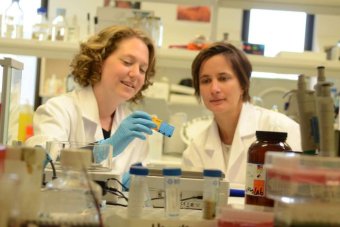The Federal Government has more than halved the number of fellowships on offer to mid-career researchers, sparking fears talented innovators could be forced to leave Australia’s shores.
The Future Fellowships program, which gives four years of funding to researchers in critical fields, has been slashed from 200 spaces two years ago to just 50 this year.
Australian Academy for Science Professor Les Field said there was a significant risk the nation’s talented researchers would leave the country.
“[The Future Fellowships scheme is] designed to support… people who’ve done their PhD [and have] a couple of years worth of experience,” he said.
“These are the researchers of the future, they’re the people who become our Brian Schmidts or our Ian Frazers and I think one of the biggest risks from this decision is that these people will look outside Australia for career advancement.”
Two hundred fellowships were funded each year between 2009 and 2013, at a cost of hundreds of millions of dollars.
In 2014, 150 were funded and Education Minister Christopher Pyne announced in a tweet on budget night that only 50 will be available this year.
“I think the research community is surprised and delighted that we have found the money for 50 Future Fellowships,” Mr Pyne said in Adelaide today.
“I’m very pleased I’ve found the money… if Labor hadn’t defunded them we wouldn’t be in this position.”
Last year’s budget allocated $140 million over four years for the scheme, capping annual numbers at 100 and limiting it to Australian researchers.
“There’s no rule that requires 100 Future Fellowships to be given each year,” Mr Pyne said.
Cuts won’t allow science to develop in Australia: researchers
University of Melbourne Associate Professor Alice Pebay was one of last year’s successful applicants.
About 18 per cent of applicants were awarded fellowships last year and Associate Professor Pebay said she expected competition to intensify significantly given how beneficial the scheme was.
“It has given me four years of research capacity,” she said.
“I can now concentrate on my research and especially on my fundamental research to find… answers to important questions such as, ‘why does a cell live and die?’
“I think these fellowship programs have helped to develop great ideas in Australia, so sadly cutting fellowships is not good for Australia because it will not allow science to develop and to lead to more discoveries in this country.”
Associate Professor Pebay’s investigations at the Centre for Eye Research involves attempting to find a cure for blindness using stem cells.
Media player: “Space” to play, “M” to mute, “left” and “right” to seek.
Audio: Jake Sturmer’s report from The World Today. (The World Today)
“We take patient skin cells and turn these cells back into a stem cell and what we do with the stem cell is ask this cell to become a cell of the eye,” she said.
“With this in mind, we can start to interrogate how this cell of the eye from this patient is becoming sick.
“This is something that could not be done years ago.”
Professor Field, who is also deputy vice-chancellor for Research at University of New South Wales said he was concerned about Australia’s ultimate direction.
“We have now seen a decline, probably since 2012 now, systematically in just the number of people we have at the coalface conducting research,” he said.
“So just the critical mass of research activity’s gone backwards.
“But secondly, you’ve got people who are coming out of their research degrees or post-doctoral careers, looking for what is the career path which I can take up and the future fellowships were always a very valuable career option for those people.”

